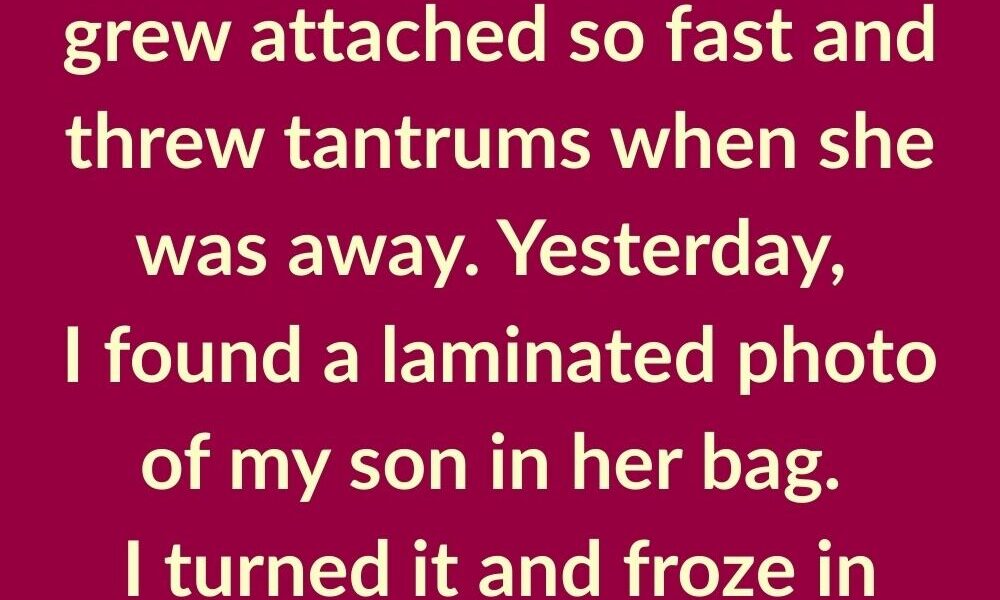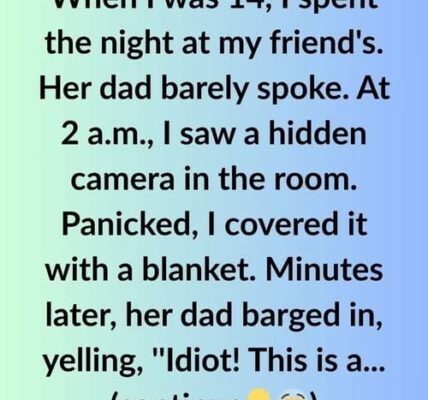We hired a nanny, a quiet, 24-year-old girl named Sabine. She showed up for the interview wearing a plain navy dress and speaking so softly I had to lean in to catch her words. She was polite, kind, and seemed to adore children. My husband, Ronan, and I had been desperate to find someone reliable. Between my new work project and his business trips, we were stretched thin. Sabine seemed like an answer to a prayer.
Our son, Dorian, 7, was instantly smitten. He’d lost his grandma the previous year, and since then, he’d been so clingy with me it was breaking my heart. But the moment Sabine came into our lives, he started laughing again. They’d build pillow forts, read books, and make cookies. He even asked her to tuck him in some nights, which left me with mixed feelings—relief, but also a sting of jealousy.
A month went by, and I noticed how Dorian cried every time Sabine left, clutching her hand and begging her to stay. It was sweet, but also unsettling. I chalked it up to how much he missed having a maternal figure around during the day. I kept telling myself I was overthinking. Sabine never overstepped boundaries, always kept me updated, and followed our routines perfectly.
Then yesterday, I was looking for his asthma inhaler in Sabine’s bag—she kept it there during outings—and found a laminated photo of Dorian tucked inside a small zippered pocket. I thought it was odd, but figured maybe she carried it for emergencies. Until I turned it over and saw two words written in delicate cursive on the back: “MY BOY.”
I froze. A cold shiver spread through my chest. My mind raced through every possibility—was she delusional? Obsessed? Planning something? I couldn’t bring myself to confront her right then. I put the photo back exactly where I found it, zipped the bag shut, and called Ronan at work. His line went to voicemail. I spent the next hour pacing the kitchen, unable to sit still.
When Sabine returned from picking Dorian up from his piano lesson, I tried to act normal. She chatted cheerfully about how he did in class, but I kept watching her every move. That night, I barely slept. My mind kept replaying the image of those two words: “MY BOY.” I started spiraling. What if she wanted to take him away from us? What if she thought she had some claim on him?
The next morning, I decided I needed answers. I waited until Dorian was watching cartoons and Sabine was folding laundry. My voice shook as I asked, “Sabine, why do you carry a photo of Dorian with ‘MY BOY’ written on it?” She stopped, her hands still clutching a tiny T-shirt. Her face turned pale, and tears welled up in her eyes. “I can explain,” she whispered, sinking onto the couch.
She took a deep breath and told me her story. Three years ago, she gave birth to a baby boy she named Milo. She was young, alone, and overwhelmed. She made the heartbreaking choice to give him up for adoption, hoping he’d have the life she couldn’t provide. She searched for him endlessly after getting back on her feet. When she saw our ad for a nanny, the address and name “Dorian” sparked something in her. She applied on impulse. The moment she saw him, she was sure he was her Milo.
My knees felt weak. My first instinct was anger—how dare she come into our home under false pretenses? But when I looked at her face, twisted with pain and guilt, my anger turned to pity. I told her we’d adopted Dorian from a private agency overseas. His birth records were sealed, but his biological mother had signed away parental rights. I’d seen the paperwork myself.
Sabine’s tears fell harder. She said she knew deep down it was irrational, but Dorian looked exactly like the baby she held three years ago. Being his nanny let her feel close to the child she’d lost. That’s why she wrote “MY BOY.” She didn’t want to take him away—she just wanted to feel like a mom again, even if it wasn’t real.
My heart ached for her. I asked why she hadn’t told us sooner. She said she was terrified we’d fire her or think she was crazy. She promised she never meant any harm, but she understood if we wanted her to leave.
Ronan came home early after I finally reached him. He sat beside me as Sabine told him everything again, tears streaming down her face. He was furious at first, but slowly his anger softened. He asked Sabine to give us time to talk it over. That evening, Ronan and I argued in hushed voices in the kitchen. He thought we should let her go immediately. I felt torn. Dorian adored her, and despite the deception, she’d cared for him like a second mother. I worried about the trauma it would cause him to lose her abruptly.
We agreed to talk to Dorian’s child psychologist, Dr. Lemaire. She listened carefully and told us removing Sabine suddenly could cause Dorian to regress emotionally. He needed stability, not more upheaval. But Dr. Lemaire also warned that we needed strict boundaries and honesty going forward.
We invited Sabine back for a conversation. I told her we’d allow her to keep working with us only if she agreed to counseling and promised transparency. She readily agreed, apologizing again for not being honest from the start. I explained she wasn’t Dorian’s biological mother, but I understood why she’d felt what she did. She promised to treat him only as the child she cared for, not one she’d lost.
Over the next few weeks, we all walked on eggshells. But gradually, things settled. Sabine proved herself worthy of our trust. She started seeing a therapist recommended by Dr. Lemaire and began working through her grief. I checked in with her daily, and our conversations grew more open. We talked about motherhood, loss, and the guilt we both felt—me for being jealous of their bond, and her for letting her pain cloud her judgment.
One afternoon, I walked into the living room to find Sabine and Dorian curled up on the couch, reading. He was giggling as she did silly voices for the characters. My heart softened completely. Sabine looked up at me and smiled—a real, unguarded smile I’d never seen before. I knew then we’d made the right decision.
A few months later, Sabine came to us with a big smile on her face. She’d been accepted into an early childhood education program. She wanted to become a preschool teacher. She said caring for Dorian made her realize she still had love to give, and she wanted to help other children. We were so proud of her.
Dorian was sad when Sabine finally left to start school, but she visited often, and they kept in touch. She never tried to overstep again, but she became a cherished family friend. Over time, I realized she’d been a blessing in disguise—not only for Dorian but for me, too. She reminded me how deep the wounds of loss can go, and how compassion can heal more than anger ever could.
Years later, Dorian asked me about Sabine. I told him the truth in simple words he could understand: she’d loved him like a second mom, but she had her own story of loss. He smiled and said, “I’m glad we helped her.” That moment made everything worth it.
Looking back, I learned that judging others without knowing their pain only deepens the hurt on both sides. Sabine’s mistake came from love, not malice. And by choosing to forgive, we gave all of us a second chance at healing.
If you’ve ever faced a situation where you didn’t know whether to trust someone again, I hope our story shows that understanding can lead to something beautiful. Don’t let fear alone decide your actions. Listen, ask questions, and open your heart.
If this story touched you, please like and share it so others can see how empathy can transform even the most complicated moments into opportunities for growth and kindness.




